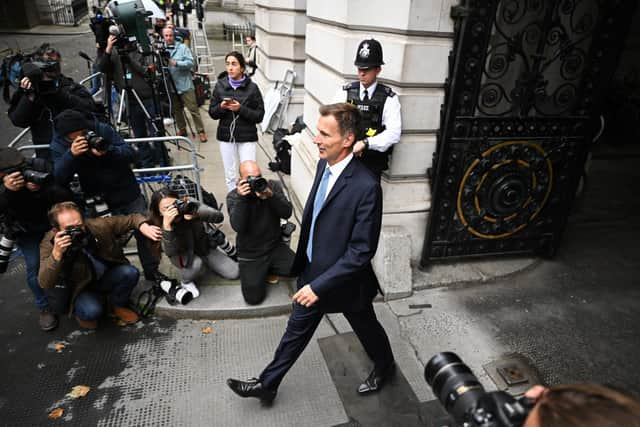Truss should have offered her resignation so a General Election could be called - Brian Monteith
The Conservative Party has thrown an 80-seat majority away in an undisciplined and self-indulgent display of first hedonism and then cannibalism that makes it unfit for power.
Faced by her colleagues’ unwillingness to back her the new Prime Minister should have sought an audience with the King and asked him to call a general election.
Advertisement
Hide AdAdvertisement
Hide AdYes, it would have meant certain defeat, but no party is entitled to run the country when its elected members are behaving in the febrile self-serving manner they are. The party, quite simply, is not fit to be called Conservative, and has not been for quite some time.


Liz Truss could then be respected for defending her view of the medicine the UK must take.
Sadly, she is as good as captured and kept in the Tower by the Rishi Sunak faction, awaiting her inevitable fate. She will be disposed of whenever it suits them, but talk is it might even be later this week. Her only hope now is to seek and survive a motion of no confidence.
Within her own administration (it’s difficult to grace it by calling it a Government) it is now Jeremy Hunt who shall dictate policy – the leadership candidate rejected by Tory MPs in July’s first ballot after receiving only 18 votes when 30 were required to enter the next round. Did Truss really choose him or was he presented as a fait accompli by Sunak’s men in grey suits? No doubt future memoirs will tell us the truth.
What we do know is Jeremy Hunt was calling for a Corporation Tax rate of 15 per cent in his leadership campaign but is now going to continue with Rishi Sunak’s increase from 19 per cent to 25 per cent – a 31.6 per cent increase that burdens the UK with one of the highest effective rates in developed economies. The policy leaves the Prime minister’s attempt at encouraging economic growth in the dungeon.
Politicians like to hike corporate taxes because people believe the myth that such taxes don't affect ordinary Joe and Jessie public – that it’s for businesses. Yet the harmful effects of increased corporate taxes fall mainly on workers and consumers.
Recent research shows about one third of the impact of increased corporate taxes falls on consumers, according to surveys of barcode-level product prices. The outcomes are regressive – being larger for lower-price items purchased by low-income households.
It also shows the biggest impact is on workers’ pay – for every £1 increase in corporate tax revenues there is a reduction in aggregate wages of £1.50 or more. Worse, for every 1 per cent increase in the UK corporation tax rate there is an annual reduction in employment of circa 100,000.
Advertisement
Hide AdAdvertisement
Hide AdThere are other negative effects of increased corporate taxes harming everyone. A 10 per cent increase in the effective corporate tax rate reduces the aggregate investment-to-GDP ratio by 2 per cent, hobbling the economic growth politicians claim they desire. There are also significant adverse effects on Foreign Direct Investment, entrepreneurial activity, and even business-level innovation.
So those who think “Yeah, they can increase corporate taxes because it doesn't affect me”, are dangerously wrong. Increased taxes on corporate income result in lower wages, fewer jobs, higher consumer prices and lower or stagnated growth. Is that what pol iticians really want for us?
The reversal of the Corporation Tax “cut” is the most risible and senseless of acts. The UK – nay, all the developed Western economies – are either already in or heading for recession. Inflation is high (and higher in many of our competitors such as the 17.5 per cent in the Netherlands) and may yet get worse until it returns to lower single digits. Union militancy is strengthening as a result and public sector strikes have become a regular occurrence again.
Most importantly, the Bank of England has been asleep at the wheel. Despite regular questioning in parliamentary committees the Governor and his team were far too complacent and should have started raising interest rates gradually long ago.
Now people are unprepared for the shock of ever-rising interest rates, first driven by the Fed raising it rates month-on-month in the US. This will continue and the Bank is now playing catch-up.
Blaming Kwarteng was misplaced and opportunist, and a Keir Starmer Government would not be able to respond any differently. Mortgages will go up due to international pressures for the foreseeable.
Will the other policies of dropping the proposed National Insurance increase, cutting Stamp Duty, loosening the IR35 rules for the self-employed and the lowering of income tax to 19p go too?
I see that Hunt is now talking of abandoning the increase in the defence budget when it is clear we face a greater military threat than at any time since the end of the Cold War. The more this administration peels off Truss’s Tory stripes the more we can see the Labour spots underneath.
Advertisement
Hide AdAdvertisement
Hide AdFor 12 years people have voted for conservatism but hardly experienced it. Well, if we are to have Labour policies of higher spending and higher taxation – as we have had so often under recent Tory administrations – it would be better the electorate vote for them and they are delivered by people who truly believe in them.
Only then can Conservatives rediscover what they actually stand for. Offering policies attractive enough to win elections only to then follow your opponents’ less popular approach only brings democracy into disrepute. This administration does not believe in itself so why should we believe in it?
Brian Monteith is a former member of the Scottish and European Parliaments and a Senior Adviser to the Tax Reform Council
Subscribe
Subscribe at www.scotsman.com/subscriptions
Comments
Want to join the conversation? Please or to comment on this article.